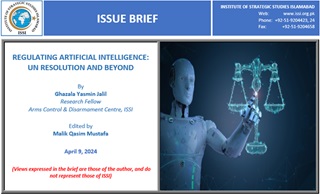Artificial intelligence (AI) is all set to revolutionize how militaries operate and conduct future wars. AI is also being incorporated in every facet of life in the civilian domain from ChatGPT to healthcare, education, agriculture, social media, advertising, customer service, financial services, and transport. AI, especially military AI, raises profound ethical and legal questions about human agency and human control. As UN Secretary General, António Guterres, has stated that “Human agency must be preserved at all cost.” However, AI has not been adequately regulated at the national and international levels. On March 21, 2024, the UN General Assembly took a “historic step forward” and adopted a U.S.-led draft resolution that highlighted the respect, protection, and promotion of human rights in the design, development, deployment, and use of AI.[1] It represents the first time the Assembly has adopted a resolution on regulating the emerging field of AI. The resolution was adopted without a vote and backed by more than 120 Member States.
The resolution had several elements that are vital for the safe and responsible use of AI. The Assembly called on all Member States and stakeholders “to refrain from or cease the use of artificial intelligence systems that are impossible to operate in compliance with international human rights law or that pose undue risks to the enjoyment of human rights.”[2] It also urged States, the private sector, civil society, research organizations, and the media, to develop and support regulatory and governance approaches and frameworks related to safe, secure, and trustworthy use of AI. At the same time, the Assembly recognized the varying levels of technological development between and within countries and urged states and other stakeholders to cooperate with developing countries so they can also profit from inclusive and equitable access, close the digital divide, and increase digital literacy. Moreover, it also recognized AI systems’ potential to accelerate progress towards reaching the 17 UN Sustainable Development Goals (SDGs).















